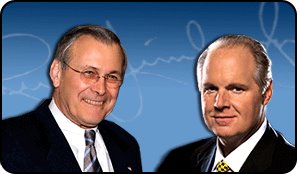
RUSH: We are thrilled and honored to have with us the secretary of defense, Donald Rumsfeld, for a few minutes. Mr. Secretary, thank you for making some time available for us.
SECRETARY RUMSFELD: Well, thank you! I'm delighted to do it. RUSH: Well, let me ask you... I've got to remind you of something. You probably won't remember the phone call to this program. It was the first time I spoke to you and it was early on in the first term of President Bush, and at the time, I forget the subject. It might have been the artillery weapon that you had voted down, but --
SECRETARY RUMSFELD: (Laughing.) I remember it well. The Crusader!
RUSH: The Crusader, but at the time it was shortly after a couple of very successful operations militarily. You were being hailed as a sex symbol in Washington, and I asked you about that. You were clearly embarrassed. You laughed and so forth.
SECRETARY RUMSFELD: (Laughing.)
RUSH: Today it's a far different circumstance, and it's a great illustration of just how things work inside the Beltway. What does it feel like to you to go through these ups and downs and to have practically the entire media jump on the case of these six generals demanding your ouster?
SECRETARY RUMSFELD: Well, you know, "This, too, will pass." I think about it, and I must say, there's always two sides to these things, and the sharper the criticism comes, sometimes
 the sharper the defense comes from people who don't agree with the critics, and I've been very pleased to see General Dick Myers and General Tommy Franks and General Mike DeLong and so many others -- Admiral Vern Clark -- step up, and people who I have worked very closely with, and they've been terrific. So I'm here at the Pentagon doing my job, working on transformation and seeing that we manage the force in a successful way, and working on things involving Iraq. For example, they just transferred over some important real estate to the Iraqi security forces today, had a ceremony which is a sign of progress there. Now what we need to see is a new government formed in Iraq.
the sharper the defense comes from people who don't agree with the critics, and I've been very pleased to see General Dick Myers and General Tommy Franks and General Mike DeLong and so many others -- Admiral Vern Clark -- step up, and people who I have worked very closely with, and they've been terrific. So I'm here at the Pentagon doing my job, working on transformation and seeing that we manage the force in a successful way, and working on things involving Iraq. For example, they just transferred over some important real estate to the Iraqi security forces today, had a ceremony which is a sign of progress there. Now what we need to see is a new government formed in Iraq.RUSH: Let me ask you about -- before I get to that, you mentioned General Myers and Mike DeLong and others that have come to your defense. They seem to be contradicting point by point the criticism. The criticism of you is that you're autocratic, that you don't listen, that you're inflexible, that you're stubborn, and the details that they're all providing counter that specifically. So why are these guys doing it now? What do you think?
SECRETARY RUMSFELD: Well, I just don't know. I can't climb into other people's minds. I was amused that Admiral Vern Clark said, "Yes, he is tough and these are tough times and we need people in government who are tough-minded and feel a sense of urgency." So I suppose beauty is in the eye of the beholder.
RUSH: Iraq. Your assessment, obviously, with the news that you just gave us is it's much better there than it's being reported, and I assume that you're optimistic about the final outcome. You say we've just got to get them to create a government. Some people think that it might be better just to launch an all-out assault on the enemy and defeat the enemy and then set up the government so you wouldn't have so many distractions and attempts to oppose that effort.
SECRETARY RUMSFELD: Well, of course it would be wonderful if there were an enemy that was in reasonable clusters of people that you could go after them. The problem is that you don't have a big army, navy or air force that you can go after. These are terrorists. These are insurgents. These are people that hide in the shadows. These are people that kill innocent men, women and children. They are not people that confront anybody in a formal way that you could go after. So what you have to do is create a presence, have a lot of tip lines so calls can come in and people who are supportive of the country and the progress that's being made can phone into the Iraqi security forces or our forces and tell them where the bad people are and then you just have to go root 'em out one or two at a time.
RUSH: How would you describe the process and the progress there?
SECRETARY RUMSFELD: Well, the progress has been good. I mean, we are now up to a quarter of a million Iraqi security forces and they're, as I say, taking over more and more bases and real estate all the time -- and we're able to transfer responsibility to them. The biggest problem we've got right now is that the people that were the people who voted in the last election, on December 15th, are now waiting for the results of that election to be manifested in a new government, and the politicians over there are struggling with that. They're trying to figure out who should be prime minister and who should be the president and who should be the various ministers, and it's taken from December 15th until today, and we're hopeful that in the next period of days, they'll pull it together. More and more, the leadership in the Kurdish community, the Sunni community and now in the Shi'a community are saying, "Let's get it done." I think it's important that the security forces that we've trained and equip have a government that they can report to and look up to and receive guidance and leadership from. RUSH: So is there an organized opposition within those three groups to prevent this government from being formed that has a chance of succeeding?
SECRETARY RUMSFELD: Well, I mean, there's no question. You're quite right. The insurgents do not want the government formed, and there are elements in the country that are actively trying to prevent that, just as they tried to prevent the election last, a year ago January. They've tried to prevent the referendum on the constitution, and they tried to prevent the December elections -- and now they're trying to prevent the government from being formed. But they failed the first three times, and they're going to fail this time. We're going to get it done.
RUSH: Let me ask you this question. You've been in the private sector and you've had plenty of public service in various positions in our government, and you've devoted your life largely to public service, and you're very much aware of our representative republic and democratic process here. We have people in the country who have been attempting, ever since shortly after the war with Iraq commenced, that are trying to gin up as many anti-war support amongst the American population as possible. Yet here you are as a member of this administration with a stated goal where Iraq and the war on terror is concerned. You have to be aware of it anti-war opinion of those in the country who have it and you're aware of the people who are trying to foment it and make it larger. How do you as a public servant square the attitude of the anti-war people if you think it's a large group of people with what are your stated goals and what the president stated goals are? How do you put those two together and end up formulating a policy and sticking to it?
SECRETARY RUMSFELD: That's a very important question, and I guess only someone who's rooted in the history of our country, I think, could accept the kinds of comments that are being made -- and if we recognize that the same kinds of criticism that occurred in the Revolutionary War and World War I and World War II and the Korean War, Vietnam War, it's not new. There have always been people who have opposed wars. Wars are terrible things. On the other hand, if every time there were critics and opponents to war, we wouldn't have won the Revolutionary War and we wouldn't have been involved in World War I or II, and if we had we would have failed, and our country would be a totally different place if it existed at all, if every time there were some critics that we tossed in the towel. I think we just have to accept it, that people have a right to say what they want to say, and to have an acceptance of that and recognize that the terrorists, Zarqawi and bin Laden and Zawahiri, those people have media committees.
They are actively out there trying to manipulate the press in the United States. They are very good at it. They're much better at (laughing) managing those kinds of things than we are, and we have to recognize that we're not going to lose any battles out in the global war on terror out in Iraq or Afghanistan. The center of gravity of that war is right here, and in the capital of the United States of America and other Western capitals, in London, they're trying. It's a test of wills, and what's at stake for our country is our way of life. They want to strike at the very essence what we are. We're free people, and our task in government, by golly, is to help protect the American people from people who killed 3,000 people here on September 11th and killed people in London and Madrid and Bali, and country after country around the world who have no problems beheading people and murdering innocent men, women and children.
RUSH: Well, it's gotta be tough, I would imagine, because I'm aware of it and I try to share with my audience as often as possible that people like you and the president know far more than the public knows about any number of events simply because it's not possible for the information that you learn to be shared nor should most of it, and yet that would have to force you at some point to say, "You know, we do have an anti-war crowd and they're loud and they're being affected by our enemy. But the American people, some of them, just don't know what we know," and you have to stick with what you think is right, and that's where the whole democratic process I would think becomes challenging for you because you have to make a judgment: Do what's right or we listen to the people?
SECRETARY RUMSFELD: Yeah. Of course if you started chasing, running around chasing public opinion polls or a handful of people who are critics of this or critics on that, you wouldn't get anywhere in this world. We need people like President Bush who are serious people, who spend a great deal of time thinking through direction for our country, set us on that course and then have the courage and the perseverance to stay on that course.
RUSH: Before you go -- and I know time is short and I've got to break, too -- but I know you're very supportive of a website that DOD has put up, "America Supports You" dot military, dot mil. What does that website help people do?
SECRETARY RUMSFELD: You know we've got such wonderful men and women out there, troops out there serving our country. They're all volunteers. So what we did is we put together a website whereby anyone who wants to can get on it and find out what other people are doing to be supportive of the troops and their families, and you can learn what school groups are doing, what corporations are doing, families, nongovernmental organizations. They are just hundreds of people who are out there doing things that are supportive of the troops and letting them know that we appreciate their service, their noble service, for our country.
RUSH: Okay, terrific. Well, we'll continue to plug that here. Let me amend it. Let me ask you one final question. Somebody on my staff is curious to know what your opinion is of embedding reporters with the military. Has that worked? Has that worked as you had hoped?
SECRETARY RUMSFELD: Well, it has. It worked during the Iraq conflict, and a lot of people who are reporters and journalists were able to work with our troops and see precisely how terrific they are, the wonderful job they do, the kinds of people they are, how professional they are -- and the rest of their lives they're going to have an impression of the American military that will be good for journalism, in my view. Furthermore, they were able, because they were embedded, to see and then give the world and the people of the United States a slice of what was actually happening, real reality, and it was a good thing. More recently, very few people had been being embedded. We're still offering that opportunity, but there have been far fewer journalists who have stepped up to become embedded. RUSH: Why do you think that is (story)?
 SECRETARY RUMSFELD: Well, it's a funny thing. I asked one reporter about that, and there was kind of the impression left that, "Well, if you got embedded then you were really part of the problem instead of part of the solution and you were almost going over to the other side," argument. I think that's an inexcusable thought, and I don't know if that's the case.
SECRETARY RUMSFELD: Well, it's a funny thing. I asked one reporter about that, and there was kind of the impression left that, "Well, if you got embedded then you were really part of the problem instead of part of the solution and you were almost going over to the other side," argument. I think that's an inexcusable thought, and I don't know if that's the case.RUSH: That's outrageous.
SECRETARY RUMSFELD: It is. (Laughing.)
RUSH: It's outrageous. I'll say it.
SECRETARY RUMSFELD: (Laughing.)
RUSH: I can't believe that. Well, look, I thank you so much for your time. I don't want to cause your schedule to get backlogged anymore. We always appreciate whatever time you have for us. I met you a couple weeks ago in New York and I forgot to tell you something. I had so many people -- as I mentioned I was going to be at the Marine dinner, and I had so many people -- in my audience tell me to be sure to tell you how much they love and respect what you're doing. So let me do it now.
SECRETARY RUMSFELD: That means a lot to me and I thank you so much, and I thank you for what you do.
RUSH: Well, thank you, sir. I appreciate it. That's Secretary -- It embarrasses me when I get thanked.
That's Secretary Rumsfeld, at the Pentagon, the Department of Defense.
END TRANSCRIPT
Background Material Regarding Rumsfeld's Answer on Embedded Reporters... (Weekly Standard: The Know-Nothing Press)
No comments:
Post a Comment